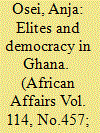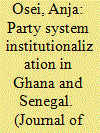| Srl | Item |
| 1 |
ID:
141477


|
|
|
|
|
| Summary/Abstract |
This article presents new theoretical and empirical insights into democratization in Africa, using the typology developed by John Higley and Michael Burton to understand elite interaction in Ghana. Social network analysis (SNA) is used to test the main proposition of the Higley/Burton theory, namely that a ‘liberal democracy is impossible without a consensually united elite’. Empirical evidence is provided from a unique data set that maps the interaction patterns between Members of Parliament elected to the Ghanaian legislature in 2012. The article shows that MPs in Ghana form a dense and strongly interconnected network bridging ethnic and party cleavages, and that MPs from different parties have developed a measure of trust in one another. These findings not only support Higley and Burton's claim that elite integration is conducive to stable democracy, but also point to new directions in African Studies by demonstrating the capacity of actor-centric approaches to explain processes of democratization in countries that lack the classic structural preconditions for consolidation.
|
|
|
|
|
|
|
|
|
|
|
|
|
|
|
|
| 2 |
ID:
145956


|
|
|
|
|
| Summary/Abstract |
It is often assumed that political parties in Africa have only weak formal structures and are instead dominated by informal, personalised networks. This paper seeks to challenge this view by presenting a much more nuanced picture of intra-party dynamics. Based on unique survey data from Ghana, it is shown how formal and informal party structures co-exist and interact at the national and constituency level. Because informal relationships are not directly observable and difficult to study, the paper employs a social network approach to map the personal interactions between the Members of the 6th Parliament of Ghana and their respective parties. It is found that the local party organisation plays a strong role in both of the major parties NDC (National Democratic Congress) and NPP (New Patriotic Party). There are, however, also differences between the parties. At the national level, the NDC is strongly centralised and dominated by its national executives. The NPP, in contrast, has an informal power center located in the Ashanti Region. Ethno-regional factions play only a minor role in both parties. By demonstrating that the relative importance of informal relations varies even between parties in the same country, the paper contributes to a better understanding of the variation in party organisation across Africa.
|
|
|
|
|
|
|
|
|
|
|
|
|
|
|
|
| 3 |
ID:
127760


|
|
|
|
|
| Publication |
2013.
|
| Summary/Abstract |
This paper presents a comparative case study of party system institutionalization in Ghana and Senegal. Both countries experienced a democratic change in government in the year 2000, but while positive development has continued in Ghana, democratic quality in Senegal decreased over time. Can the concept of party institutionalization help to explain this diverging development? Four dimensions of party system institutionalization are systematically compared: regularity, social roots, legitimacy, and party organization. It is found that party competition in Ghana is characterized by high stability and a low number of parties. The major parties are organized throughout the country and have definable support bases with deep historical roots. They give orientation to voters and are perceived as legitimate actors. In Senegal, in contrast, the party system is fluid and less predictable. Parties are not structured along social cleavages and many of them are weakly organized and highly personalistic. In summary, the case studies support the assumption that an institutionalized, well-structured party system in which relevant social cleavages are translated into electoral alternatives is positively related to democratic quality.
|
|
|
|
|
|
|
|
|
|
|
|
|
|
|
|